Education for Sustainability at St Mary’s College

This article has been written by the Education for Sustainability (EfS) mentors of St Mary’s College Rose-Hill (Mauritius). They were trained by Anneloes Smitsman from 2012-2017. This is their final evaluation report that highlights how they implemented the EfS principles at their secondary school, in their activities and pedagogy from 2016-2017. The EfS programme is now brought under EARTHwise Thrivability Education.
Education for Sustainability at St Mary’s College from 2016-2017
From 2014, in line with our commitment towards Education for Sustainability (EFS), students of Travel and Tourism in Grade 13 have organized their Event Management projects, bearing in mind specific Sustainable Development Goals – SDG.
Multi-cultural night at Kas Poz Restaurant and Bar, Ebène
Culture was one of the themes chosen for the students’ projects. Our students believe that no development can be possible if it does not include the society as a whole; its people, “who they are and what shapes them” in their cultural identities. In that respect, they decided to raise awareness to the different components of the Mauritian culture, whilst instilling the desire to preserve the local traditions and customs for the future generations. Thus, a taste of our cultural heritage was made possible through a Multi-cultural night.
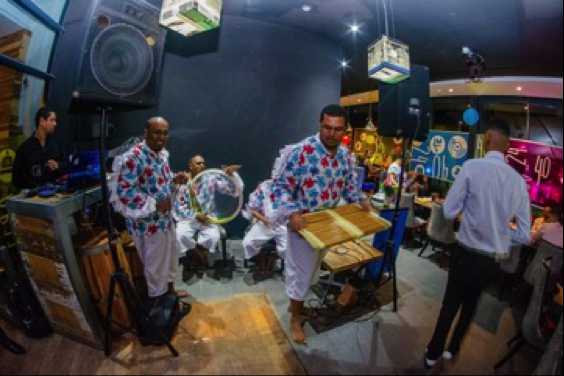
A way to make the guests rediscover the different cultures present in Mauritius through the following set objectives:
- To sensitize people about the benefits of continuing particular customs and practices.
- To entertain customers while promoting local talents.
- To build a sense of pride within our guests.
- To instill respect for other cultures amongst Mauritians.
For this event, guests had the opportunity to assist to a talk delivered by a representative of the Mauritius Tourism Promotion Authority (MTPA) on the rich cultural background of Mauritius, and on how this contributes to the latter’s uniqueness as a destination.
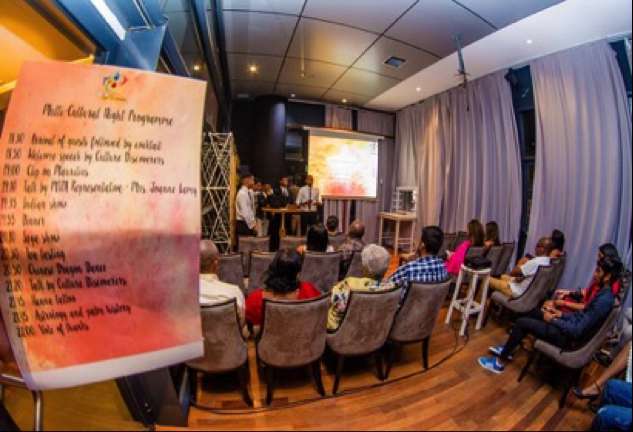
To encourage local talents and pride within the Mauritians, local artists were invited to perform. Applications of henna tattoos, astrology as well as local tea tasting were also offered to the guests as part of the Mauritian culture and lifestyle. Guests were able to taste a variety of Mauritian cuisine that stems from the different cultures present on the island. Another theme that was highlighted was respect for the environment through eco-friendly games… Along that line, a fun day was organized at Ile-Aux-Cerfs.
Full day at Ile-aux-Cerfs
As the United Nations also encourage sustainable consumption and respect for the environment, students have opted to organize a fun day at Ile-aux-Cerfs, to sensitize people on the benefits of using safe and eco-friendly games.
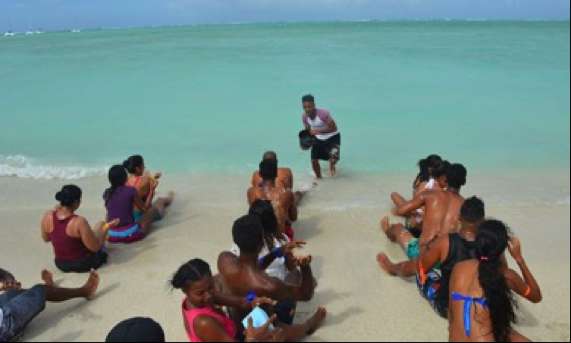
This project is based on the idea of “doing more and better with less” as communicated by the United Nations. The organizing team targeted a group of 25 youngsters who were willing to experience simple and non-motorized activities at the beach.
The objectives of this project were:
- To encourage team spirit within the participants.
- To make customers aware about the importance of preserving the environment.
- To entertain participants using simple and traditional games.
- To better the organizational skills of the team
The organizing team made sure that most of the activities that were made up took into consideration the protection of the environment and the promotion of local practices and know-how. Participants were able to learn how to construct fishing rods using bamboo sticks, and were introduced to recreational fishing.
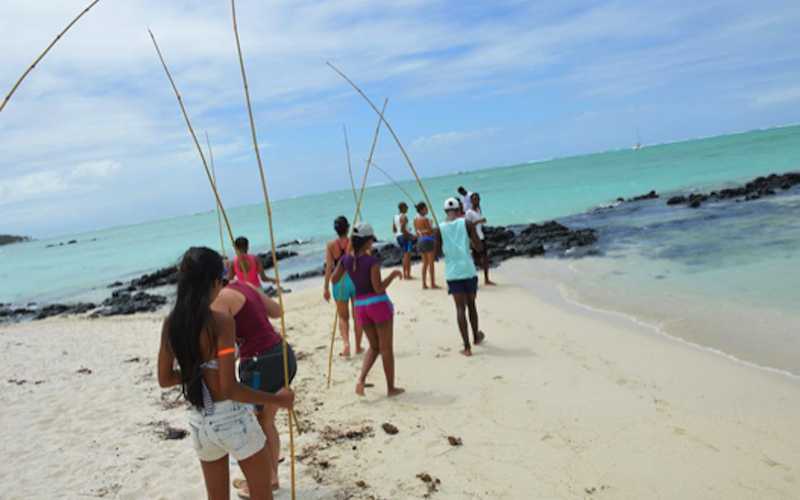
This particular activity was chosen to value the fishing profession as a traditional job as well as to remind participants of the old days when fishing was a favorite hobby for Mauritians amongst friends and families.
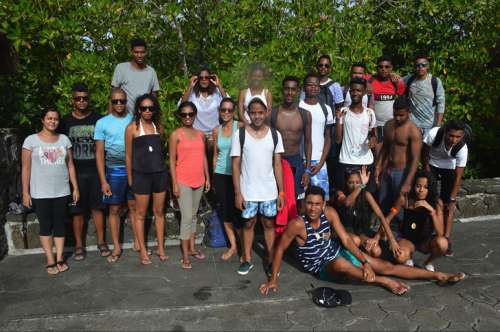
The Science Department has been very active at infusing fun, excitement and discovery in the various projects at different grade levels. Some of these projects are listed below:
1) Conservation and distribution of water
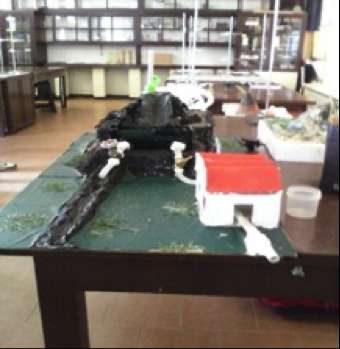
2) Building of 3D models of food webs for different ecosystems
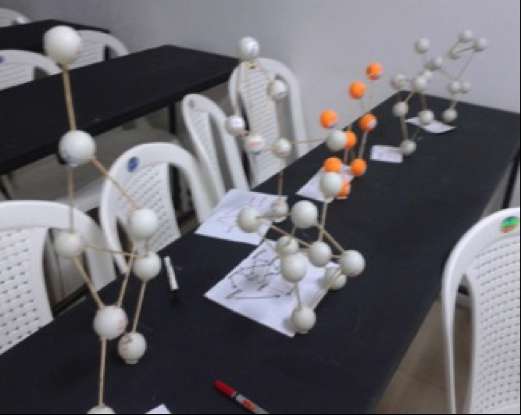
Aim: to recognize the interconnections between different organisms in an ecosystem
Project description: students were given ping pong balls labeled with different organisms. They were asked to link them using wooden stick to form a 3D food web. They also recognized the interdependence between the different species and how if one organism is directly affected there is an indirect impact on other organisms.
3) Building a 3D model of a volcano and stimulating a mini volcanic eruption
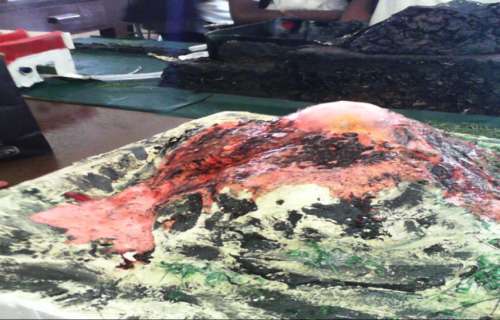
Aim: To recognize that a volcanic eruption has not only negative impacts but also produces new materials like rocks, fertile soil and minerals for future generations
Project description: students were asked to build a 3d model of a volcano by reusing scrap material like old newspapers, old plastic bottles, and polystyrene from used packaging. They were also asked to simulate a mini volcanic eruption using vinegar and sodium bicarbonate mixed with a red coloring agent
They were also asked to list its constructive and destructive effects on nature. Emphasis was placed on more sustainable ways of managing our resources.
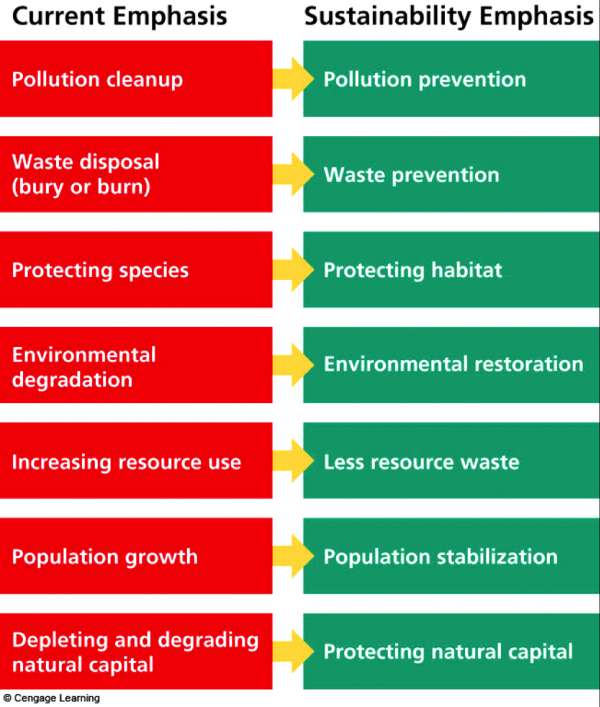
Simple ways for sustainable living were examined in class and students were expected to live those changes at home and within the school compound.
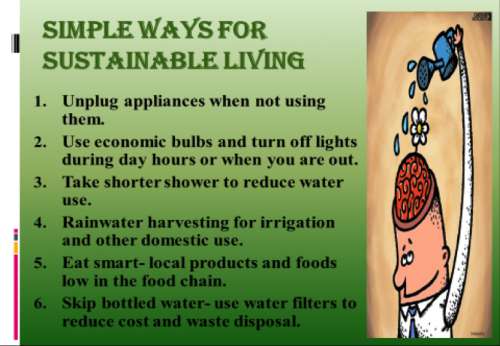
In line with sustainable living, one of our section leaders, Ms. Delphine Didier, has put into place a system to encourage and reward students’ good habits whilst indirectly sanctioning bad behaviours. The gist of this system is however not to sanction any individual student for his wrong doing or wrong being as we believe that this may lead to personal grievances. Instead, the class as a whole is required to take responsibility of each student and each one’s individual actions. Class attitude, team spirit and interconnectivity are key factors that are given primary importance.
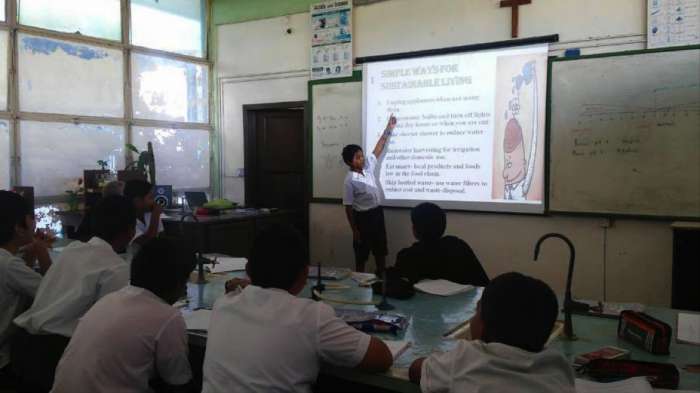
The students, as a class are expected to:
- Show respect for each other and for all attendants and teachers, displaying good manners
- Take care of the tidiness of the class and ensure that wastes are properly sorted out.
- Care for the class plants, school building and premises.
- Ensure that resources are preserved; tap closed after use, fan and lights turned off when not in use.
- Do all their homework to the satisfaction of the respective educator.
- Excel academically and in sports.
- Actively participate in class and activities.
Each positive remark from teachers to a student of a particular class qualifies the class for a “STAR”. Each negative remark on the other hand attaches a “CLOUD” to the same class. The class with the most stars and least clouds over a term, wins an outing during the holidays. This system has been quite effective in grade 7 and 8. We are looking forward to extend it to higher levels by next year.
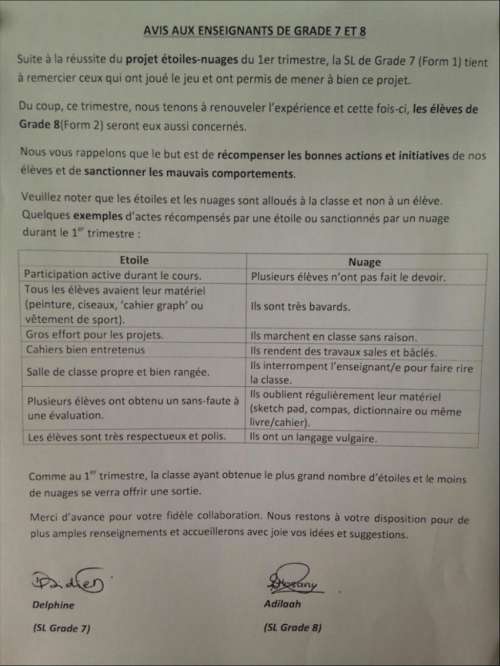
Human Values at the core of Sustainability
The Human Values department’s theme for 2017 is “Prenons conscience de nos Valeurs”; translation… “Let’s be conscious of our Values”. This seems to be such a simple thing to do and yet difficultly achievable for many of our students. They have extensively long ‘TO DO lists’ that dangerously waive out their ‘TO BE list’!
An alarming reality that defies sustainability; if we can’t BE who we ARE irrespective of what we decide to DO, the logic says that we would always need to keep doing things to prove our self-worth! Added to it would be the stress and sense of unworthiness and broken confidence associated with each and every case of failure that could be experienced along the way.
In the department, we have taken cognizance of this serious situation and have tried over the current year to bridge the gap. As it has been the case over the last few years, our yearly retreats have been an explorative platform to revive the “Being” in each student. These educative retreats, in addition to an inquisitive learning approach to life has had as objective to push away the frontiers of ignorance about one’s own self. Indeed, what avails a man if he knows everything, but is ignorant about his own self! Our scope was to invite students to be more aware of their BEING through their DOING. We thought that it would be really wonderful if everyone would be willing to BE more aware, BE more relaxed, BE more open, BE more inclusive, whilst accomplishing their everyday tasks.
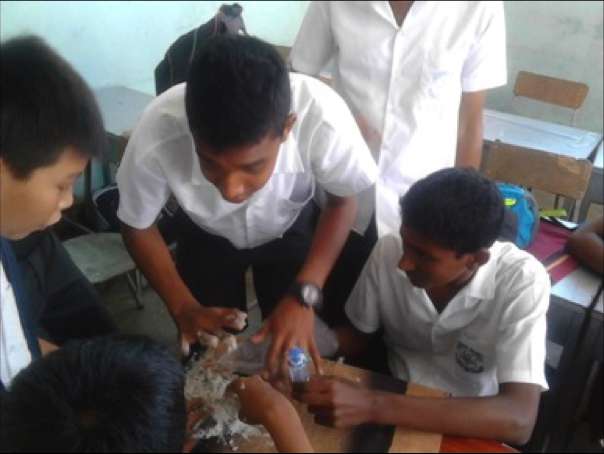
A lively and friendly environment for learning
We would have indeed been delighted to see “learning by doing” paving the way towards “learning by being”. But we need to recognize that we are not yet there! We still need to put in more lovingness, more awareness, and more presence in our way forward, so as to bring about this shift in consciousness.
Such a shift would mean amongst other things that our students would be able to:
- Live by choice rather than chance
- Be motivated instead of manipulated
- Be a solution instead of a problem
- Be useful instead of being used
- Make changes instead of excuses
- Excel rather than to compete
This year, our chosen themes per level were as follows:
F1: Our local festivals, a multi-cultural celebration.
F2: Going beyond my fears and limitations. I am, so I can.
F3: Developing my personality through my interrelations and interactions.
F4: Living healthily, away from Sexually Transmitted Diseases.
F5: Forgiveness! A way life and a way of being.
L6: Paving the way to my dreams. Where do I start?
U6: Discovering my ultimate possibility by unleashing my inner potential.
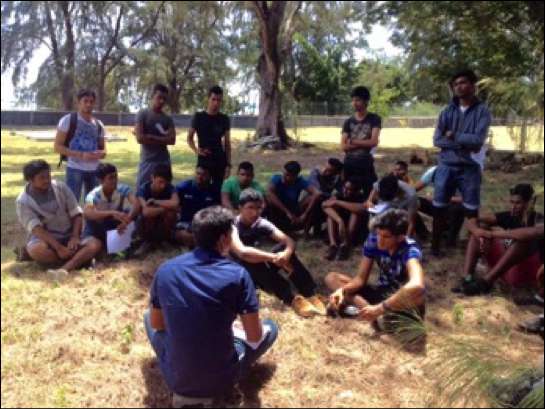
Sharing of experience as a source of inspiration, during a retreat (L6 students)
Our Human Values department thus perseveres in its agenda to assist each student in his personal evolution. We believe that Education can only be sustainable if it frees our mind from the shackles of unconsciousness. This certainly is a big challenge, but we trust that the bigger the challenge, the bigger is the opportunity for growth. We know from experience that difficult roads often lead us to beautiful destinations and since we want to make a difference in the world, we are ever aiming at doing things differently; with a higher level of consciousness. We indeed want to take our future in our hands…
“The best way to predict your future is to create it”.
Maybe, we won’t always make the right decisions. Most probably, we will make mistakes along the way, but we do understand that failure is not the opposite of success, it is part of it.
Written by the EfS Mentors & Teachers of St Mary’s College Rose-Hill, Mauritius: Samantha Gundowry, Shakeel Moossajee, Stéphanie Deruisseau, and Anamantoo Boni Bangari

